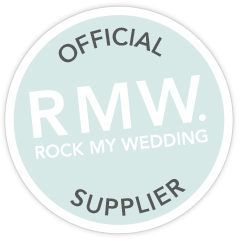Fancy yourself a lean, green, eco-friendly wedding planning machine?
We’ve compiled some top tips to put yourself on track for a sustainable and eco-friendly wedding.
It’s well known that eco-friendly often goes in hand with economically friendly (the phrase win, win never felt so humble and serene), so many of these tips will also be kind on your budget.
Wedmin Warning: Some of these ideas require some additional eco-friendly wedding admin and research. So, if you’re struggling to balance wedding planning with real life (you’re not alone!) don’t fret! Look into the technicalities where you can, but for a simple approach, keep these 7 questions at the forefront of your decision making and you’re sure to reach an eco-conscious, (and budget friendly) decision.
Do we want it? Or do we just feel like we should have it…
Can we go without? Will we notice (and mind) if its not there on the day…
Can we make it? Have we got time to fashion it, or do we know someone helpful who can…
Can we hire it? Instead of it needing to be manufactured and shipped to us…
Can we reuse it? Or will it end up in landfill…
Can we donate it? If we can’t use it after, can someone else re purpose it…
Onto the eco-friendly wedding technicalities…
Guest List
This one is EASY. One of the biggest decisions you can make to minimise the impact of your wedding on the environment overall, from the level of waste created, to the amount of power required, is to limit your guest list. Reducing people, reduces everything (including the bill)! Enough said.
Location, Location, Location!
Next: the single biggest way to reduce your wedding’s carbon footprint will be to get married somewhere that minimises travel and transportation for your wedding party. So, choose a location where most of your guests live. Or, one that means minimal travel for the minimum number of guests.
Then, go local to that location for everything else! This immediately minimises your suppliers travel requirements. As well as being kind to the environment, this will boost local economy which is always fantastic.
Ensure that guests can stay as close to the venue as possible if they can’t return to their own homes. Arranging mass transport like coaches or mini-buses is ideal to minimise vehicles travelling to and from your venue. Or, you could create a way for your guests to communicate to arrange to car share with one another.
If you need to make visits to the area to see your suppliers, keep journeys to a minimum by combining multiple supplier meetings on the same day. You may need to give advanced notice to get this arranged and you may need to make trips on weekdays rather than weekends.
Eco-Friendly Wedding Venue Hunting
Existing Buildings
Now this is a wide area… you could go as all out as searching for a venue that specifically classify themselves as an eco-friendly wedding venue with the facilities and technology to back their claim. Solar panels, underfloor heating, composting loos, anaerobic digesters, low watt appliances etc. Or, you can simply be mindful of the following basics.
Any existing building, especially one that is purposed as a wedding venue, will automatically be eco-friendlier than other options because, for one thing, they don’t require construction. They also tend to come with more ‘in-house’ supplies, which will limit how much transportation of goods is required.
For example, they may have cookers and fridges in situ, they will likely have toilet facilities already, furniture like tables and chairs and they may even have cutlery and crockery onsite meaning your caterers will have less to transport. They will also be likely to have waste disposal systems in place onsite. Double check that they dispose of waste responsibly for your peace of mind.
Marquees
Marquees are arguably a less eco-friendly wedding choice because they require transportation to be constructed and power from generators, which are often fueled by petrol or diesel. They also require transportation to deliver (and collect) all of your furniture, equipment, bar, bar stocks, catering deliveries, etc. However, it’s not all doom and gloom! If you are using a marquee you can easily take steps to make eco-friendly wedding choices. Start by requesting a low emission generator and minimise the power you will need during the day. This is easy to do:
Lights don’t need to go on until dusk/darkness – candles can supply light too
Ask your band/DJ to create sets that can operate with minimal power
Go without heating if it’s summertime (tell guests to bring a jacket for the evening) or at least keep it to a low level if absolutely required
Ask caterers to bring minimal electrical appliances and supply them with clear sides to minimise their need for lighting during the day
Other eco-conscious points to consider for your marquee:
Ensure with your venue/location that your marquee company can pin walls and supports into the ground rather than using water weights (which will require eye watering amounts of water from a tap onsite)
Marquee carpets are single use! So, go without carpets if your marquee company offers another flooring option, or ensure that the carpets are used for good after the event. For example, some marquee companies donate left over carpet to allotments for gardeners to use as insulation – avoid carpets going to landfill as an absolute priority!!
Organise your waste disposal in advance . Your suppliers should remove any waste they themselves create, but you will likely need to dispose of any waste created by your own supplies. E.g. general litter, bottle/can disposal etc. Provide dedicated containers for certain types of waste to make this smooth and easy on the day. Then after the event you can simply take your ready sorted containers to a local recycling centre
Food, Glorious Food
As mentioned earlier, reducing your guest numbers automatically reduces the waste created by your wedding. This includes the catering. Be it food waste or litter, fewer people will naturally create less rubbish.
Going veggie or vegan is an eco-friendly wedding master move. It’s cold hard science that meat farming and production contributes to our negative impact on our environment. So, veggie or vegan menus will naturally be more eco-conscious. BUT, only if the produce used can be sourced locally and seasonally.
So, before you go picturing mangoes and sweet potatoes on the menu, be aware that ingredients like this would need to be imported. This would immediately pile on the food miles, undermining the aim of going veggie/vegan for environmental reasons. Your catering team should be able to source awesome local and seasonal produce instead!
You could take this one step further. Whether its a meaty menu or a veggie/vegan menu, ask your caterers to design something unique with a zero-food-waste menu. With some innovative thinking and experimental chef-ing, you could create a menu that utilises every part of its ingredients, from peels to seedy cores, with little to zero going to waste.
Find out how your caterer disposes of their waste. Do they recycle? Do they separate general litter from food waste? There are plenty of steps that caterers can take to reduce their own impact. For example, all of Pickle Shack’s food waste (which we keep to a bare minimum) goes into our food waste bin, which is disposed of in an anaerobic digester on our business park. This then powers the business park with electricity!! #humblebrag
Drinks
As for bar and drinks services, whether you go for a DIY bar or hire a bar company, find a way to gain some control over what products are served.
Then, source local drinks wherever possible, from suppliers who can deliver with minimal miles traveled. Here are some other quick-fire tips for an eco-friendly wedding bar:
Bag In Box drinks (BIBs), or ‘Party Pins’ allow you to supply beers/ciders/ales without needing to use harmful gasses like CO2
Bagged ice in large containers can do just as efficient a job of chilling drinks as fridges that require additional power can – you can arrange ice collections or deliveries on the Big Day to avoid needing a freezer
A bit of organisation during set up can make recycling of glass bottles easy and manageable – get some containers and label them
Avoid single use plastic and ask guests to reuse their glasses to minimise your requirements of these
Straws made from any material, recyclable or otherwise, are ultimately unnecessary
Garnishes like lemons and limes will be from imported sources. These alternative examples can all be sourced seasonally in the UK: berries, cucumbers, mint, apples
Keep your bar selection simple and streamlined – check out our ‘how to’ post on curating a DIY bar.
Style and Décor
Hire don’t buy!
Hiring decorative items instead of buying them means no new products must be manufactured to meet your needs. And, after your wedding, those items will be used over and over so the re purposing effect continues.
You should be able to find companies local to your chosen venue to minimise miles traveled for any deliveries. If you hire any items from further afield, investigate whether they can be collected and returned by a guest who might live near to that location and be travelling already.
Sourcing maximum items from minimum suppliers is key. So, if you’re looking at just one item from one supplier, and another supplier you are already using has something similar or alternative, it’s a no brainer to go with the latter.
Paper
You’ll find that suppliers such as stationers are already conscious of their products impact on the environment. They are likely to already source recycled and/or recyclable, or natural materials, but if in doubt have a chat with them about making sure this is the case. If it’s important to you, they will almost certainly oblige, especially if you are working on a bespoke basis.
Stationers can offer helpful design advice to get as much information onto as little paper as possible, whilst still getting a gorgeous result. Your stationer may even be able to consult on digital design work if you are interested in going completely paper-free… something to get chatting about with them!
Speaking of paper-free, digital alternatives such as e-vites are gaining popularity and you can also build a wedding website to share all the key information. Some of the more high-tech versions of these can also collate your RSVP’s for you!
Candles
The most romantic form of décor and a staple you’ll likely want to include in your eco-friendly wedding day. Choose candles carefully though.
Go for clean, long burning options. Double check that they are made of sustainable materials that won’t release nasty chemicals into the atmosphere. Did you know there are companies who make candles out of used wax? Look into sourcing from places like this and at the end of the wedding take any stubs back to the them to be recycled again!
High quality, clean burning candles will almost certainly come with a higher price tag than their less eco-conscious counter parts. So, be prepared to invest a little more money for the cause here.
Alternatives
Scrap wedding favours of any kind! These inevitably lead to litter and your guests honestly won’t miss them at all! Oh look at that, you’ve automatically covered the cost of those eco-friendly wedding candles by saving on favours.
Choose tables that don’t require cloths if you can. Laundry is notoriously un-environmentally friendly. If using linen is unavoidable, choose a supplier who launders responsibly using minimal toxic substances, and as a bonus, one with a sustainable source of power.
Use recyclable napkins instead of linen ones. There are some great options for the finding out there! But, as with anything you source that is recyclable, make sure that staff on the day take care to keep items like this separate from other waste, so that they do get recycled! Briefing your suppliers on your efforts and providing easy to use separate waste containers will help to ensure they follow through on your vision of an eco-friendly wedding.
Florals and Foliage
Naturally you’ll need to pick a local florist! They should be able to source florals and foliage locally and seasonally. Imported flowers could add huge emissions and could cost more too. Locally grown, seasonally cut flowers really are the best of the bunch.
Insist that no floral foam (Oasis) is used in any arrangements. Plenty of florists already avoid using this and have come up with much more eco-conscious alternatives to suspend and display flowers.
Check how your florist disposes of any unused flowers. Do they go to compost rather than general waste? If you are keeping florals after your eco-friendly wedding, make sure you dispose of them responsibly too. Ask your venue whether they have a compost heap. They might be grateful of the floral nutrients on their lot! As may any gardeners among your guests.
Another great option is to use potted plants instead of cut flowers. Your florist likely has potted plants in their collection to create cool centre pieces. Much like hired decorations these will be multi-use so they can be re purposed over and over.
Confetti. This one is super important! Ask your florist to supply natural petals, fresh or dried, for confetti. Or, go for no confetti at all. Even the fully ‘bio degradable’ stuff still takes days to weeks to decompose and litters its environment in the meantime. Natural confetti will break down quickly and will nurture and feed its environment as it decomposes.
You could even hire false flowers. Some are truly incredible, appearing so real you would only know that they aren’t if you carry a magnifying glass on your person. Or go without flowers altogether, using other decorative items instead.
Outfits and Accessories
Don’t lose momentum on your eco-friendly wedding efforts with your outfits. There are a few easy ways to avoid the ‘throw away fashion’ culture of occasion wear, whilst still looking and feeling FAB on the day:
Go preloved. Be it the dress, the suits or the bridesmaids gear. Vintage shops and fairs have some completely stunning options available. These are also likely to be unique to anything on the general market. Do your family have any of their wedding outfits in storage? Wearing or recycling your mum or grandma’s gown, or dad or granddads’ suit could be a fun and nostalgic addition to the day!
If you’re going bespoke, ask your dress/suit makers to source materials that have been made responsibly and sourced fairly. It may not be possible to trace the ethical origins of silks or cottons shipped from distant lands. You could source fabrics made on home soil from responsibly sourced materials instead. Do be aware that if you designer doesn’t already use these products, supplementary costs may apply to source them. Do the same research on fabric sources if buying outfits straight from a store too.
Let members of the wedding party choose their own outfits. They are more likely to wear them again rather than stowing away or throwing away.
Apply the same logic of the two points above to shoes and accessories!
Wedding Rings
This one is really important. If you can, find a local crafts person to make something unique, and go minimal with precious metals and stones.
Be realistic and knowledgeable about where metals and stones are sourced. Chances are they won’t come from a lovely local mine. The travel related emissions and the ethical impact of production methods could be detrimental to your eco-friendly wedding efforts, and your conscience in general. Vintage options are ideal because they are naturally re purposed. However, their origins might be hard to trace.
Local jewelry makers and crafts persons might have more control over how and where they source materials. They may even be able to recycle metals and stones from existing jewelry in your own or in your family’s collections.
As with almost any bespoke supplier you come across, if an eco-friendly wedding is important to you, they’ll make it important to them, so never be afraid to ask!


